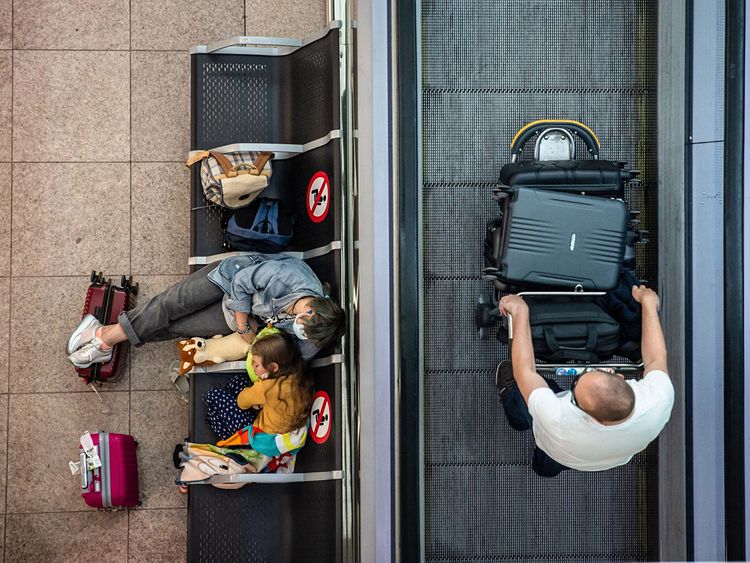
Dubai: With the Omicron variant leading to countries across the world updating their travel guidelines, you may be wondering how the latest COVID-19 development may affect your travel plans.
If you are planning to travel to or from India during the winter break, here is all you need to know about the steps you need to follow.
While India has extended the ban on scheduled international flights to the end of January 2022, passengers from the UAE can still travel to India as the UAE and India have signed an air travel agreement. India’s Ministry of Health and Family Welfare (MOHFW) also issued guidelines for international passengers arriving in the country on November 30, following concerns related to the latest COVID-19 variant.
“The existing guidelines have been revised in view of reporting of a new variant of SARS-CoV-2 (B.1.1.529; named Omicron) which has been now classified as Variant of Concern by the World Health Organisation (WHO),” the guidelines read.
These guidelines came into effect from December 1, 2021 and include special quarantine and genome testing requirements for passengers arriving in India from certain countries.
What are the red list countries?
List of countries from where travellers would need to follow additional measures on arrival in India, including post-arrival testing
(List updated on November 30, 2021)
- Countries in Europe including The United Kingdom
- South Africa
- Brazil
- Botswana
- China
- Mauritius
- New Zealand
- Zimbabwe
- Singapore
- Hong Kong
- Israel
Flying from the UAE to India
Based on the guidelines, these are the steps you need to complete:
1. Take a PCR test 72 hours before your flight’s departure time. You would need to submit the negative result of this test while filling out the Air Subidha form.
2. Submit self-declaration form on the online Air Suvidha portal – https://www.newdelhiairport.in/airsuvidha/apho-registration – before the scheduled travel, including last 14 days travel details.
3. On arrival PCR test, a random sample of two per cent of travellers will be asked to take a PCR test. If they test positive, the sample will be sent for genome testing and treatment will be followed as per laid down protocol. If the test result is negative, they will be asked to self-monitor their health for 14 days.
Important note: Based on each state’s requirements, you may also need to pay for on-arrival testing. This information will be provided by individual airport authorities.
4. If you are travelling from one of the countries that are listed as at risk, you will need to follow the following protocol:
- Submission of sample for post-arrival COVID-19 test at the point of arrival (self-paid). Such travellers will be required to wait for their test results at the arrival airport before leaving or taking a connecting flight.
- If they test negative they will follow home quarantine for seven days. A re-test will be done on Day 8 of arrival in India and if negative, further self-monitoring of their health is required for the next seven days.
- However, if such travellers test positive, their samples should be sent for genomic testing at one of the labs in the Indian SARS-CoV-2 Genomics Consortium (INSACOG) laboratory network.
- They shall be managed at separate isolation facility and treated as per laid down standard protocol including contact tracing.
- The contacts of such positive case should be kept under institutional quarantine or at home quarantine monitored strictly by the concerned State Government as per laid down protocol.
Children exempted from PCR testing
The guidelines also provide exemptions from the PCR testing requirements to children:
Children under five years of age are exempted from both pre- and post-arrival testing. However, if found symptomatic for COVID-19 on arrival or during home quarantine period, they shall undergo testing and treated as per laid down protocol.
Travelling from India to the UAE
If you are travelling from India to the UAE, these are the steps you would need to follow:
1. Entry permit/GDRFA or ICA approval – An approval from the General Directorate of Residency and Foreigners Affairs (GDRA) or Federal Authority for Identity, Citizenship, Customs and Ports Security (ICA) is not required for tourists travelling to the UAE.
If you are a UAE resident, you would neet to apply for a GDRFA or ICA approval.
2. PCR test within 48 hours – A valid negative COVID 19 PCR test certificate with a QR code for a test conducted within 48 hours, validity should be calculated from the time the sample was collected, prior to departure from an approved health facility.
3. A rapid PCR test report with a QR code for a test conducted at the departure airport within six hours of departure.


